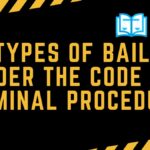Table of Contents
What is Custody?
Custody is provided by the CrPC in order to make sure that there is no chance of the suspected persons to get away from the hands of law. Normally, police custody is beneficial for serious offences i.e., when FIR has been registered against another alleging offences of a serious nature such as rape, murder, dowry death, acid attack etc. When a person is under the supervision of the police officer then it is called custody. Accused are taken to police custody in a cell to be questioned and investigated upon.
Police Custody
A police custody basically means when the police have physical custody of the accused. It is when the accused is in the police lock-up i.e., under the supervision of the investigating officer. The person is kept in police custody after arrest is done to the accused for offences of arrest without warrant. However, an accused can only be kept under police custody for a period of 24 hours after which the concerned magistrate decides whether the accused shall be kept there or shifted to judicial custody reading section 57 of the CrPC & section 167(2). Police custody can extent up to maximum of 15 days only.
Judicial Custody
A judicial custody is wherein the accused is locked in jail under the custody of a magistrate. It can stretch up to maximum of 90 days for serious offences punishable up to 10 years whereas for other offences maximum stretch is only 60 days.
What are the remedies & rights of arrested person?
Article 22 provides that the arrested person has to be produced before the respective magistrate within 24 hours & also has right to free legal aid. Further, as per section 167 of the CrPC if the police fail to file the chargesheet even after the extension of 60 or 90 days then the accused shall be competent for bail. Furthermore, the accused is entitled to file for writ of Habeas Corpus in case the custody is not valid or any other legal right of the accused has been violated.
Difference in brief
| Serial No. | Police Custody | Judicial Custody |
| The accused is kept in lockup by the investigating officer. | Accused is locked in jail which is custody of respective Magistrate. | |
| Accused is maximum kept up to 24 hours before he is taken to magistrate. | The accused is kept in jail as Magistrate deems fit as per the crime and chargesheet reports. | |
| After filing of the FIR/complaint to the police the police custody begins & is taken to custody as and when the accused is caught and arrested. | It begins only after the prosecution establishes that jail is needed for accused for investigation. | |
| Though within 24 hours the accused has to be taken to magistrate, the time can be extended up to 15 days as per Magistrate. | Maximum time period for detention is 90 days at max for serious offences that is 10 years offences, life imprisonment offences and death penalty offences whereas in other offences it is only 60 days. | |
| The security is of the police itself. | The security is provided by the respective magistrate. |

Users not registered with Strictlylegal can Email us their content and the same are posted through this account. In case of abuse, kindly let us know at [email protected]




